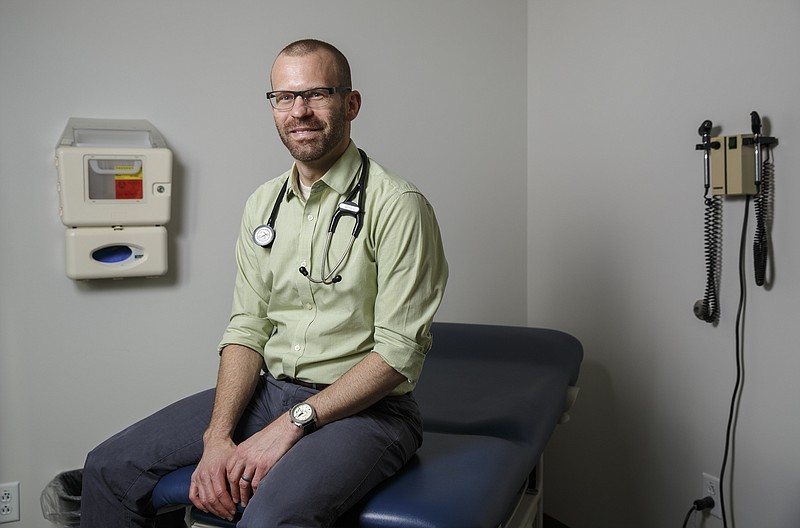Three months ago, I could barely walk, pain like a live wire roaring through my back and leg.
"A herniated disc," the doctor said.
After I moaned about this in an earlier column, many of you responded with your own pain story: back, neck, shoulder and so on. Pain is the great common denominator among us; living pain-free, the new American Dream. Pain affects more of us than cancer, heart disease and diabetes. Combined.
But I may have stumbled onto something. A cure, of sorts.
What if our pain isn't what we think it is?
More Info
For more info on “Pain Matters,” visit centerformindfulliving.wildapricot.org or call 423-486-1279.
Earlier this fall, desperate, I did what the doctors ordered:
An MRI of my spine.
One epidural.
Another epidural.
Pills and months of physical therapy.
I noticed a subtle current, like a lazy river, pushing me toward surgery. Plus, the MRI was treated like an oracle: had you asked any doctor to identify and locate the source of the pain - pin the pain on David - they would have fixated on my spine. My herniated disc. Why would we look elsewhere? If you have a flat tire, you don't tinker with the radiator. Simply fix the flat.
No one ever asked me about my emotional health.
Or stress. Or spirit.
Or tension. Or things I was angry about.
Why would they?
There is the body.
There is the mind.
Two separate things, right?
(Note to reader: this is where the ride gets bumpy. Alternative ideas can be hard to swallow.)
The turning point came when a friend loaned me a book by Dr. John Sarno, who spent decades promoting the unorthodox claim that pain like mine - and maybe yours - was not physical.
But psychological.
"Physical symptoms are initiated by emotional phenomena," wrote Sarno, who died in June, in "The MindBody Prescription."
Oh yes, the pain is quite real. It's gritted-teeth, howl-at-the-moon real.
And yes, pain can be completely physical; slice your toe off, and that pain has nothing to do with emotions.
But Sarno taught that some pain, like my herniated disc, was a smokescreen for trouble elsewhere.
"Internal conflict ... stresses and strains of daily life ... the residue of anger from infancy and childhood," Sarno wrote.
Crazy, right? But Sarno's work cured thousands, like ABC's John Stossel, Howard Stern and Larry David, while birthing a new generation of 21st-century physicians, who now view pain through a lens of neuroscience and psychology.
Not the mind, alone.
Nor the body, alone.
But mindbody, together.
Like Dr. Howard Schubiner, a Michigan physician. (Watch his "The Reign of Pain" video on yourpainisreal.com.)
And Alan Gordon, who directs the Pain Psychology Center in L.A. (Check out tmswiki.org.)
And Dr. Matt McClanahan, a physician at CHI Memorial's Center for Integrative Medicine on Main Street.
"Pain is reliably caused by tissue damage in the body, but it can also be activated by neural pathways in the nervous system," he said.
Neural pathways, like grooves and ruts in our brain, allow us to hunt, gather, practice guitar, work at Starbucks and respond to threats. If I feel fear every time I'm in a crowd, then, over time, that unexamined neural pathway - crowds equals fear - gets rutted and developed.
Whenever the threat appears, the brain responds with pain - like a car alarm - in the body.
Countless suffering patients, for whom surgery hasn't worked, find their pain softens and lifts when they begin to investigate emotions, personal history and daily stress. Research shows the bulging discs and degenerative disc disease are common in middle-aged folks who report no pain at all. (Bulging discs are often like wrinkles, Sarno said. Part of aging.)
"This explains why so many body-based treatments like physical therapy, manipulation, injections, and even surgeries have proved ineffective," McClanahan said. "They have not addressed the true cause of the pain."
My 90-minute appointment with him was a turning point in my life. We talked not only about my back, but also theology, powerlessness, grace and the role of self-compassion and meditation.
"This is much more a fear problem than a tissue problem," McClanahan said.
View other columns by David Cook
On Saturday, Jan. 27, McClanahan hosts a workshop called "Pain Matters." Held at the Center for Mindful Living on Main Street, the day-long event costs $50, and is an introduction to this new approach to pain relief.
"There is no time when the brain cannot be changed for the better," he said, "and many troubling symptoms can effectively be reprocessed or unlearned."
Today, my pain is still present, but in small degrees. I see it as a teacher, not an enemy.
There's a lot I'm not telling you - my own path of pain relief will be different than yours - but I never had surgery. No third epidural. No more pills. (Journaling's way more effective.)
I have a renewed relationship with my body - thank you, Tim Russell and Janka Livoncova.
On New Year's Day, three months after barely walking, I ran 10 miles.
Yes, there is a place for surgery and pills and thank God for MRIs and mainstream doctors.
But now more than ever, there is a place for the wisdom of mindbody medicine.
David Cook writes a Sunday column and can be reached at dcook@timesfreepress.com or 423-757-6329. Follow him on Facebook at DavidCookTFP.

